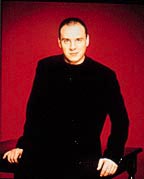Matthias Goerne - German Baritone Extraordinaire by Uwe Siebert
/ May 1, 2000
Version française...
 Nothing is more exciting than to realize that one is living
through a Golden Age in the history of singing. In the last decade
the staggering renaissance in the performance art-song has been
made possible by a new generation of artists. Along with Wolfgang
Holzmair, Christophe Prégardien and Thomas Quasthoff, the
German baritone Matthias Goerne is at the head of this elite group.
Nothing is more exciting than to realize that one is living
through a Golden Age in the history of singing. In the last decade
the staggering renaissance in the performance art-song has been
made possible by a new generation of artists. Along with Wolfgang
Holzmair, Christophe Prégardien and Thomas Quasthoff, the
German baritone Matthias Goerne is at the head of this elite group.
Goerne is an immensely personable, deeply affecting man, with
an infectious smile and luminous eyes. Modern in dress and appearance;
he wears a lot of casual black and keeps his hair almost stubble
short. His musical approach is also modern in its communicative
immediacy, his singing characterized by a rare refinement and
depth of feeling as well as an innate musicality.
Goerne was a precocious musical talent and laughs when reminded
that he is said to have declared at age nine, when a boy chorister
in his home-town of Weimar, that he wanted to be a singer. "Like
all children, I wanted to be a lot of things when young but I
soon realized that music needed to be part of my life."
His youthful talents were encouraged by such guiding lights
as Elizabeth Schwarzkopf and Dietrich Fisher-Dieskau and he is
most often compared to the latter. "He is a magnificent musician,
a towering figure who certainly conveyed to me the importance
of the marriage between words and music." And indeed Goerne
has the same ability to illuminate words musically and give them
a hitherto inconceived impact but in Goerne's case, without artifice.
Even vocally there are similarities; Goerne has a high, light
baritone of beauty and unsuspected range and power. But its impact
lies in how it is used; the range of interpretative colours and
control of dynamics are revelatory.
Though he has several operatic roles in his repertoire (including
Mozart's Papageno, Puccini's Marcello and Berg's Wozzeck) it is
to the concert stage and recital platform that he most often returns.
Bach is one of his "first and most important musical loves.
There are such interpretive and vocal challenges in performing
Bach well, but the rewards are incredible." (His recent Decca
release of Bach cantatas emphasizes his brilliance in this repertory.)
He has already demonstrated on the recital platform and on
record that his readings of Schubert, Schumann and even Eisler
rank him among the finest of the younger generation. He has attracted
the interest of such renowned pianists as Andreas Haeflinger,
Vladimir Ashkenazy, and Alfred Brendel, with whom he toured last
year. "It was a thrilling yet demanding tour because we were
touring with two different programmes and often alternated them.
Brendel has a fabulous intellect and is an awesome musician. He
is simply a figure of legend, and performing with a legend can
be overpowering yet incredibly fulfilling."
This year Goerne's North American tour accompanist is a long-time
partner, Eric Schneider. They have worked together often since
Goerne exploded onto the international scene by winning the 1990
Hugo Wolf competition. And appropriately Hugo Wolf (as well as
Schumann) are featured on this season's North American recital
programme which once again demonstrates Goerne's programming flair.
The Wolf group includes such famous Goethe's settings as
Prometheus and Ganymed but also the three Harfenspieler.
Similarly the Schumann has Nachtlied and Abendlied side
by side with five settings to poems by Nikolas Lenau. This sort
of inspired and inspiring programming is part of the man. He loves
to explore new and neglected areas of the repertoire. "There
is so much marvellous music, like the Eisler Hollywood Liederbuch
that I was fortunate enough to record, that does not deserve to
remained unperformed."
His discography reflects this perfectly. As well as the Eisler
lieder it includes the same composer's Deutsche Symphonie
and von Braunfels' opera Die Vögel. Similarly when
he was approached by Graham Johnson to record for Hyperion's landmark
complete Schubert edition, he was awarded the plum, Die Winterreise
but also recorded perhaps the single most impressive song in the
whole series, the fabulous Im Walde, D.708.
Johnson has called Goerne "one of the most comprehensively
astonishing talents I have ever come across." And indeed
the British pianist worked with Goerne in Europe earlier this
year to widely enthusiastic acclaim in Holland, Spain and Italy.
Goerne's busy schedule takes him to all the major concert venues
in Europe such as the Salzburg Festival, Vienna's Musikverein,
Berlin's Konzerthaus, London's Festival and Wigmore Halls. "I
try to pace myself, not singing too much but also giving myself
time to prepare well and spend as much time as I can at home."
In recent years Goerne has become increasingly popular in North
America. As well as his recital tours, he has made debuts at the
New York Met in 1998 and Carnegie Hall the following year. Now
it is Montreal's turn to fall under this singing wizard's spell.
Goerne makes his Montreal debut on May 19 with the André
Turp Musical Society at Pollack Hall. (514) 397-0068. Two days
earlier on May 17, Goerne performs the same program at the Toronto
Centre for the Arts. (416) 870-8000.
Matthias Goerne Discography
Schumann. Liederkreis, op. 39 et 12 Gedichte,
op. 35. (Eric Schneider, piano) , Decca 460 797-2.
Schumann. Dichterliebe et Liederkreis op.
24 (Vladimir Ashkenazy, piano), London 289 458 265-2.
Bach. Cantatas. Sir Roger Norrington, Camerata Academica
Salzburg, Decca 466 570-2.
Eisler. The Hollywood Songbook (Eric Schneider,
piano), London 289 460 582-2.
Schubert. Goethe-Lieder (Andreas Haefliger, piano),
London 452 917-2.
Version française... | 

